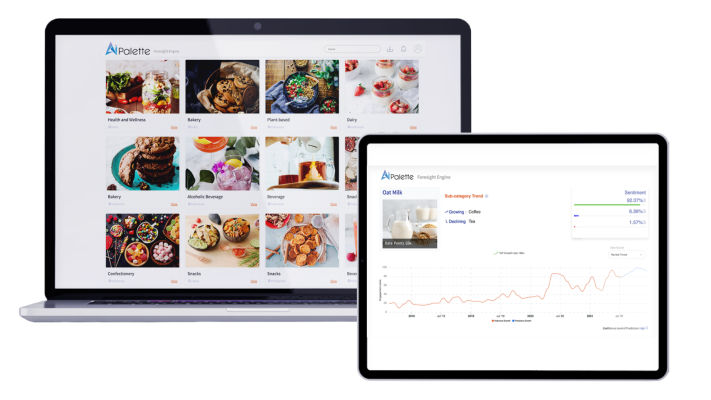Business
Ai Palette raises $4.4M to help companies react faster to consumer trends

Developing new packaged foods and consumer goods can take a couple years as companies research, prototype and test products. In a society that runs on social media, however, people expect to see trends land on store shelves much more quickly. Founded in 2018, Ai Palette uses machine learning to help companies spot trends in real time and get them retail-ready, often within a few months. The startup, whose clients include Danone, Kellogg’s, Cargill and Dole, announced today it has raised an oversubscribed $4.4 million Series A co-led by pi Ventures and Exfinity Venture Partners. Both will join Ai Palette’s board.
The round also included participation from returning backers food tech venture firm AgFunder and Decacorn Capital, and new investor Anthill Ventures. It brings Ai Palette’s total raised to $5.5 million, including a seed round announced in 2019.
Ai Palette is based in Singapore, with an engineering hub in Bangalore. Its customer base started in Southeast Asia, before expanding into China, Japan, the United States and Europe.
Its customer base started in Southeast Asia and India, and expanded to China, Japan, the United States and Europe. Ai Palette supports 15 languages, which the company claims is the most of any AI-based tool for predicting consumer packaged goods (CPG) trends. Its funding will be used to expand into more markets and fill engineering and data science roles.
Ai Palette was founded in 2018 by chief executive officer Somsubhra GanChoudhuri and chief technology officer Himanshu Upreti, who met through Entrepreneur First, the “talent investor” that recruits and teams up potential founders.
Before Ai Palette, GanChoudhuri worked in sales and marketing at Givaudan, the world’s largest manufacturer of fragrances and flavors. This allowed him to see how product innovation is done for many types of consumer products, ranging from snacks and fast food to packaged goods. Many of the companies he worked with were beginning to realize that a two-year product innovation cycle could no longer meet demand. Upreti, an advanced machine learning and big data analysis expert, previously worked at companies including Visa, where he built models that can handle petabytes of data.
Ai Palette’s first product is Foresight Engine, which tracks trends like ingredients or flavors, analyzes why they are popular and predicts how long demand will last. It also identifies “white space opportunities,” or situations where there is unmet demand. For example, GanChoudhuri said the COVID-19 pandemic has changed the way people eat — they are now eating health snacks up to six times a day in front of screens — so companies have the chance to release new kinds of products.
Foresight Engine gives contextual information, said Upreti. “For example, is a food item eaten on the go, or at a café. Is a product consumed socially or individually? What’s trending at kids’ birthday parties? For a specific product or ingredient, images provide information on product pairings and product format.”
The platform uses data from sources like social media, search, blogs, recipes, menus and company data. “Data sets popular to each market are prioritized, like a local recipe or a food delivery app,” said GanChoudhuri. “And they are tracked over the years to determine growth trajectory with a strong degree of confidence.”
Some specific examples of how Ai Palette’s tech has translated into new products include brands that want to launch a new flavor, like for a potato chip or soda, in a specific country. They can use the Foresight Engine to not only see what trends are rising, but which ones have the potential to become long-term favorites, so they don’t invest in a product that will almost instantly lose its popularity.
Many of Ai Palette’s clients have used it to react to new trends and consumer behavior patterns during the COVID-19 pandemic. Not surprisingly, people in many markets are interested in healthy food or ones that are supposed to boost immunity. For example, in Southeast Asia there is more demand for lemon and garlic, while acerola and yerba mate are trending in the United States.
On the other hand, “in China, taste is paramount, even over health, because people are looking for food that brings back a sense of normalcy,” said GanChoudhuri. Meanwhile in India, there is demand for products with longer shelf life as people continue to cope with the pandemic, but many consumers are also seeking interesting snacks to ease the boredom of lockdown, with kimchi and other Korean flavors becoming especially popular.
Ai Palette’s ability to work with many languages is one of the ways it differentiates from other machine learning-based trend-prediction platforms. It currently supports English, simplified Mandarin, Japanese, Korean, Thai, Vietnamese, Bahasa Indonesian, Bahasa Melayu, Tagalog, Spanish, French and German, with plans to add more as it targets new European countries, Mexico, Latin America and the Middle East.
-

 Entertainment7 days ago
Entertainment7 days agoWhat’s new to streaming this week? (Jan. 17, 2025)
-

 Entertainment6 days ago
Entertainment6 days agoExplainer: Age-verification bills for porn and social media
-

 Entertainment6 days ago
Entertainment6 days agoIf TikTok is banned in the U.S., this is what it will look like for everyone else
-

 Entertainment6 days ago
Entertainment6 days ago‘Night Call’ review: A bad day on the job makes for a superb action movie
-

 Entertainment6 days ago
Entertainment6 days agoHow ‘Grand Theft Hamlet’ evolved from lockdown escape to Shakespearean success
-

 Entertainment6 days ago
Entertainment6 days ago‘September 5’ review: a blinkered, noncommittal thriller about an Olympic hostage crisis
-

 Entertainment6 days ago
Entertainment6 days ago‘Back in Action’ review: Cameron Diaz and Jamie Foxx team up for Gen X action-comedy
-

 Entertainment6 days ago
Entertainment6 days ago‘One of Them Days’ review: Keke Palmer and SZA are friendship goals

















